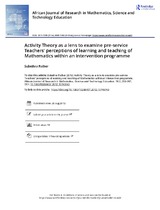Activity theory as a lens to examine pre-service teachers' perceptions of learning and teaching of mathematics within an intervention programme
Abstract
This study was prompted by concerns around mathematics teaching and learning in the South
African education system. Contributory factors to this situation are the lack of competent
mathematics teachers in the classroom and mathematics at-risk students entering teacher
education programmes. This paper reports on how a mathematics intervention programme
(MIP) assisted in shaping at-risk student teachers’ perceptions of their learning and teaching of
mathematics. Activity Theory (AT) is used as a theoretical lens for examining these students’
perceptions. Qualitative data were collected using in-depth interviews with 12 students and their
written and graphical reflections of their experiences in the MIP. The results confirm that the
students’ perceptions of their learning and teaching of mathematics had changed. Furthermore
the study provides evidence that strategically planned interventions to deal with historically
imbalances can and do work. The study concludes that the MIP had a positive effect on the
students with regard to improving their attitudes and level of confidence in learning and teaching
mathematics.

